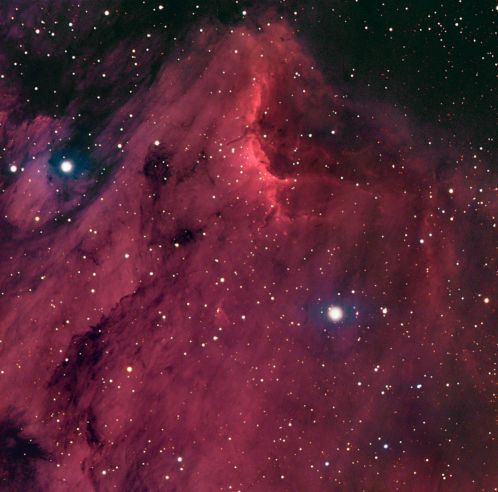
|
Credit & Copyright: Robert Gendler
Explanation:
The Pelican Nebula, also known as IC 5070, lies about 2,000 light-years
away in the high and far-off
constellation of Cygnus, the Swan.
This picture spans a portion
of the magnificent nebula about 30 light-years wide.
Fittingly, this cosmic
pelican is found
just off the east "coast" of
the North America Nebula,
another surprisingly familiar looking
emission nebula in Cygnus.
In fact, the Pelican and North America nebulae are part of the same
large star forming region.
The two glowing
nebulae appear separated from our vantage point
by a large obscuring dust cloud running across the upper
left corner in this
gorgeous
color view.
Within the
Pelican
Nebula, dark dust clouds also help define
the eye and long bill, while a
bright front of ionized gas
suggests the curved shape of the head and neck.
Even though it is almost as close as the
Orion Nebula,
the stellar nursery marked by the Pelican and North America
nebulae has
proven complex and difficult to study.
|
January February March April May June July August September October November December |
| ||||||||||||||||||||||||||||||||||||||||||||||||
NASA Web Site Statements, Warnings, and Disclaimers
NASA Official: Jay Norris. Specific rights apply.
A service of: LHEA at NASA / GSFC
& Michigan Tech. U.
Based on Astronomy Picture
Of the Day
Publications with keywords: emission nebula - Pelican Nebula - Cygnus - star formation - IC 5070
Publications with words: emission nebula - Pelican Nebula - Cygnus - star formation - IC 5070
See also:
- NGC 1333: Stellar Nursery in Perseus
- APOD: 2025 December 28 Á NGC 1898: Globular Cluster in the Large Magellanic Cloud
- NGC 253: Dusty Island Universe
- APOD: 2025 October 21 Á IC 1805: The Heart Nebula
- Young Suns of NGC 7129
- APOD: 2025 December 17 Á W5: The Soul Nebula
- APOD: 2025 December 9 Á The Heart of the Soul Nebula
